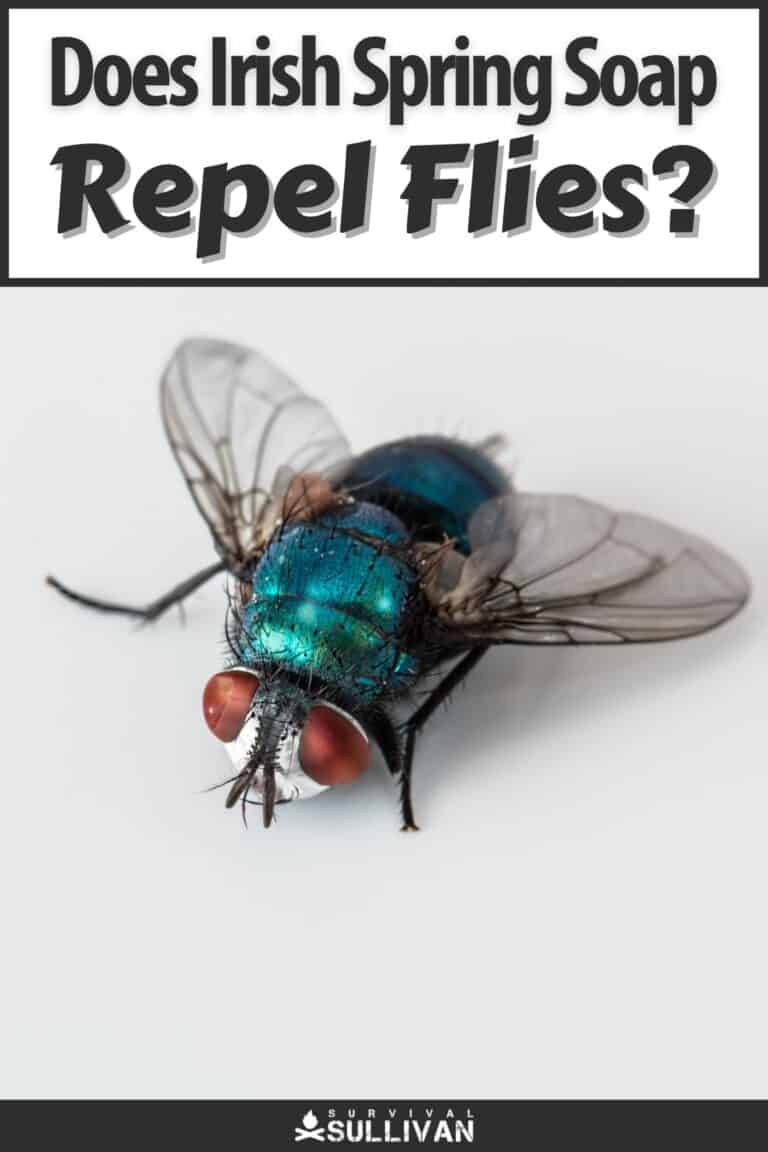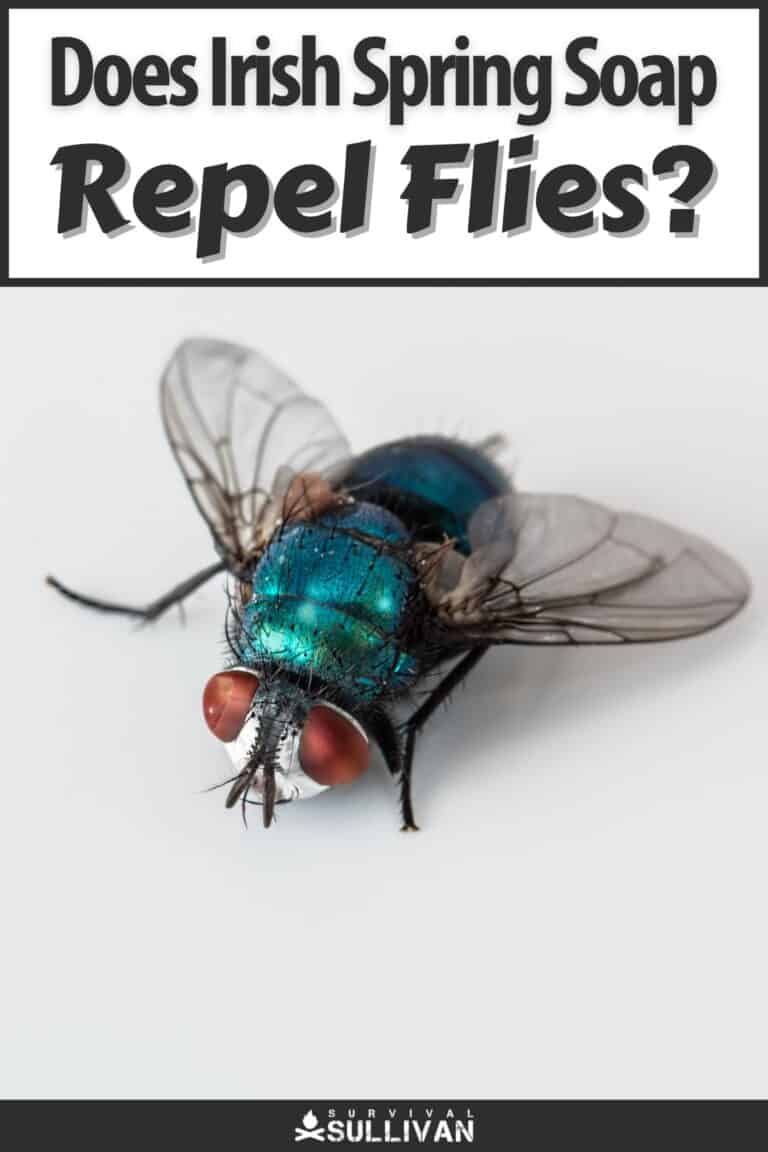Everyone understands the aggravation of having a fly loose in their home, but beyond annoyance flies can be a serious problem since they can spread disease.

Anywhere you have nasty odors or filth accumulating you can count on flies showing up. That will always make a bad situation worse, and there are plenty of techniques for preventing flies from hanging around.
If you have been looking for an innovative DIY solution to the problem, you might have stumbled across the recommendation of using Irish Spring soap for repelling flies and other insects.
But could this possibly work? Does Irish Spring repel flies?
No, Irish Spring will not repel flies. Though Irish Spring does have some use for repelling mammals and reptiles, the same cannot be said for flies and other insects.
I know this is probably a huge letdown considering Irish Spring is both safe and cheap, but it just doesn’t work.
That being said, there is indeed a way to use soap for insect control and not just when it comes to cleaning up the messes that attract so many of them in the first place. Keep reading to learn more.

What is the Theory Behind Irish Spring as Fly Repellent?
Irish Spring just does not work as an insect repellent, though the principles for why it works on other animals are definitely valid. When it comes to insects, though, it just doesn’t work as it does against mammals or reptiles.
The notion that Irish Spring is somehow repellent to flies and other insects varies depending on who is telling the tale, but it usually revolves around one of several possible explanations.
The first is that there is some ingredient in Irish Spring that is inherently disorienting or repulsive to insects, and they will try to get away from it at all costs.
Another common explanation is that Irish Spring actually contains a few ingredients that are found in insect repellents or bug killers at turns, again depending on who is telling the story.
Lastly, some assert that the strong, fresh aroma of Irish Spring simply covers up the scent of other things in the air that will attract flies and other insects, meaning it sort of camouflages things that would otherwise draw them near.
Sadly, none of these are functionally true in practice. Flies are not overtly deterred by the smell of Irish Spring, and the smell of Irish Spring does not mask the odor of various fly attractants.
And though there might be ingredients in Irish Spring that are indeed present in various insect repellent or pest control products, they are not active ingredients that will deter or kill insects. Sorry!
Is Irish Spring Harmful to Flies if they Touch It?
Again, no. Coming into contact with Irish Spring is not harmful to flies, or at least reliably harmful enough to kill them off should they touch it.
But, as I mentioned above at the beginning of this article there is indeed a way to use common soap as effective insect control, and we will talk about that in just a minute.
Will Flies Be Attracted to Irish Spring?
No. At the very least, putting out a bar of Irish Spring to keep mammals away (or for any other purpose) is not going to draw more flies to your home or property.
Flies are not drawn by the smell of soap alone, but it is not out of the question that fruity-smelling soaps might attract them as flies are commonly drawn to sweet or fermented things.
This is another thing that we can use against them, and I will tell you how in the next section.
How Can You Use Soap to Get Rid of Insects?
It is indeed possible to use a common household soap for insect elimination and control, though Irish Spring is not the right soap for the job.
What you can make, though, is an insecticidal soap solution using nothing more than dish soap, a cap full of vegetable oil, and warm water.
So why does this soap work to kill insects? As it turns out, pretty much all insects have a carapace, or exoskeleton. This exoskeleton is covered by a wax-like coating called the cuticle.
When this cuticle is degraded or destroyed, two things happen. The carapace itself becomes more vulnerable to damage, and insects start to lose moisture at a rapid rate. Once they dehydrate, they die.
As you might have guessed already, the powerful degreasing capability of dish soap will seriously degrade the cuticle on an insect’s exoskeleton.
By liberally spraying the solution on plants that you want to protect or any surfaces that can be treated with it you can ensure that insects that come into contact with it will be killed off, particularly if they touch it repeatedly.
The best part about this option is that it works passively and only needs periodic refreshments to maintain effectiveness. It is also completely safe for people and pets.

Make a Fly Trap with Soapy Water and Vinegar
Another option for killing flies specifically using soap is to rig up a small fly trap with a jar of apple cider vinegar, a little water, and a dab of dish or hand soap.
Flies are drawn to the smell of apple cider vinegar almost like nothing else, and you can exploit this tendency by putting some in an old jar, thinning it down with just a little bit of water, and then putting a drop of soap in there before stirring it all up.
The soap is there because it breaks the surface tension of the liquid, meaning that flies that fall in will not be able to get themselves out.
then, all you need to do is cover the top of the jar with Saran wrap, foil, or any similar material before poking some holes in it that are just big enough for a fly to crawl into.
Once they go in, they will rarely be able to get out, and eventually they will tire of flying, fall into the vinegar mixture and then drown.
You can easily create this trap in a short period of time when it is needed and it will work automatically with no mess and no muss until you need to change out the liquid.

The post So, Does Irish Spring Soap Repel Flies? appeared first on Survival Sullivan.
By: Tom Marlowe
Title: So, Does Irish Spring Soap Repel Flies?
Sourced From: www.survivalsullivan.com/irish-spring-soap-repelling-flies/
Published Date: Mon, 21 Nov 2022 16:00:00 +0000
-------------------------------------------------------------------------
Did you miss our previous article...
https://outdoorsnewswire.com/survivalist/these-20-nonelectric-devices-will-work-after-an-emp
 CampingSurvivalistHuntingFishingExploringHikingPrivacy PolicyTerms And Conditions
CampingSurvivalistHuntingFishingExploringHikingPrivacy PolicyTerms And Conditions
